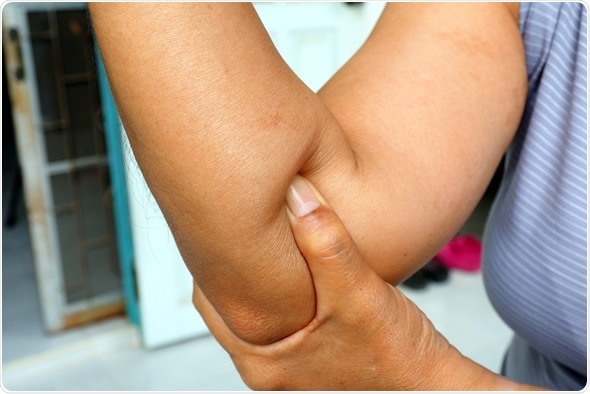Elbow Pain Management

The appropriate management of elbow pain depends greatly on the cause of the pain, which should be addressed. For most patients, the pain management plan includes a combination of non-pharmacological and medical options to relieve the hurt. A small number of patients may require surgery to relieve the pain, although this is usually reserved for refractory cases, when the pain is unresponsive to other treatment methods.

Non-Pharmacological Techniques
Physical therapy often plays a significant role in the management of elbow and arm pain. It is helpful in increasing the strength and flexibility of the joint so that the trauma and the pain are less likely to recur. Hot and cold therapy, such as applying ice to the area, can also help to reduce inflammation and pain after an injury.
A physiotherapist is usually involved in the care plan to recommend appropriate stretches and exercises for the individual. Stretches to improve the range of movement of the elbow, and prevent contractures, are important. Additionally, exercises using resistance bands or lightweight strengthening exercises are often recommended to improve the strength of the muscles that support the elbow joint.
Acupuncture, involving the insertion of needles into certain points in the body, is commonly used in the management of elbow pain and other types of pain. It is not understood how this technique offers a benefit but many people report positive results.
Massages to the affected area and surrounding tissues can also help to relieve elbow pain. This can help to relieve stress and tension in the connective tissues and facilitate healing.
Medications
Simple analgesic medications are usually the first-line option for the quick relief of elbow pain. Examples of these include oral acetaminophen (paracetamol) and aspirin. Non-steroidal anti-inflammatory drugs (NSAIDS) such as ibuprofen or diclofenac are also common choices. Some of these are available in a topical formulation for application to the affected area.
There are several local injections that may be recommended in the management of severe elbow pain. Corticosteroid injections can help to reduce inflammation in the elbow and are very effective in relieving pain in this region. Platelet-rich plasma (PRP) is an injection of the patient’s blood sample that has been treated to increase the concentration of platelets. Substances released from platelets help to stimulate healing and reduce pain.
When used on an ongoing basis, disease-modifying anti-rheumatic drugs (DMARDS) can modify the course of chronic inflammatory diseases, such as arthritis, and reduce the progression of pain. Biologic response modifiers are another class of drugs that can also help to reduce pain related to rheumatoid arthritis by inhibiting the immune system.
For patients with gout that is causing elbow pain, a medication such as allopurinol can reduce the concentration of uric acid in the blood, and reduce the likelihood that a gout attack will occur.
Surgery
In a small number of elbow pain cases, surgery may be required to provide pain relief. There are various procedures that may be recommended, depending on the cause of the elbow pain. Examples of surgical procedures that may be used include fracture repair, arthroscopy, and elbow replacement.
Rehabilitative care is important after any surgical procedure to improve the strength and flexibility of the elbow joint as the area heals. In most cases, frequent checkups are required in the weeks following the procedure.
References
- http://www.arthritis.org/about-arthritis/where-it-hurts/elbow-pain/treatment/elbow-arthritis-medication.php
- http://www.arthritisresearchuk.org/arthritis-information/conditions/elbow-pain/treatments.aspx
- http://www.arthritis.org/about-arthritis/where-it-hurts/elbow-pain/treatment/elbow-surgery.php
- https://medlineplus.gov/ency/article/003172.htm
- https://www.betterhealth.vic.gov.au/health/conditionsandtreatments/elbow-pain
Further Reading
- All Pain Content
- Using a Pain Diary
- How Do We Sense Pain?
- Role of Dopamine in Pain
- Common Causes of Stomach Ache
Last Updated: Feb 26, 2019

Written by
Yolanda Smith
Yolanda graduated with a Bachelor of Pharmacy at the University of South Australia and has experience working in both Australia and Italy. She is passionate about how medicine, diet and lifestyle affect our health and enjoys helping people understand this. In her spare time she loves to explore the world and learn about new cultures and languages.
Source: Read Full Article




